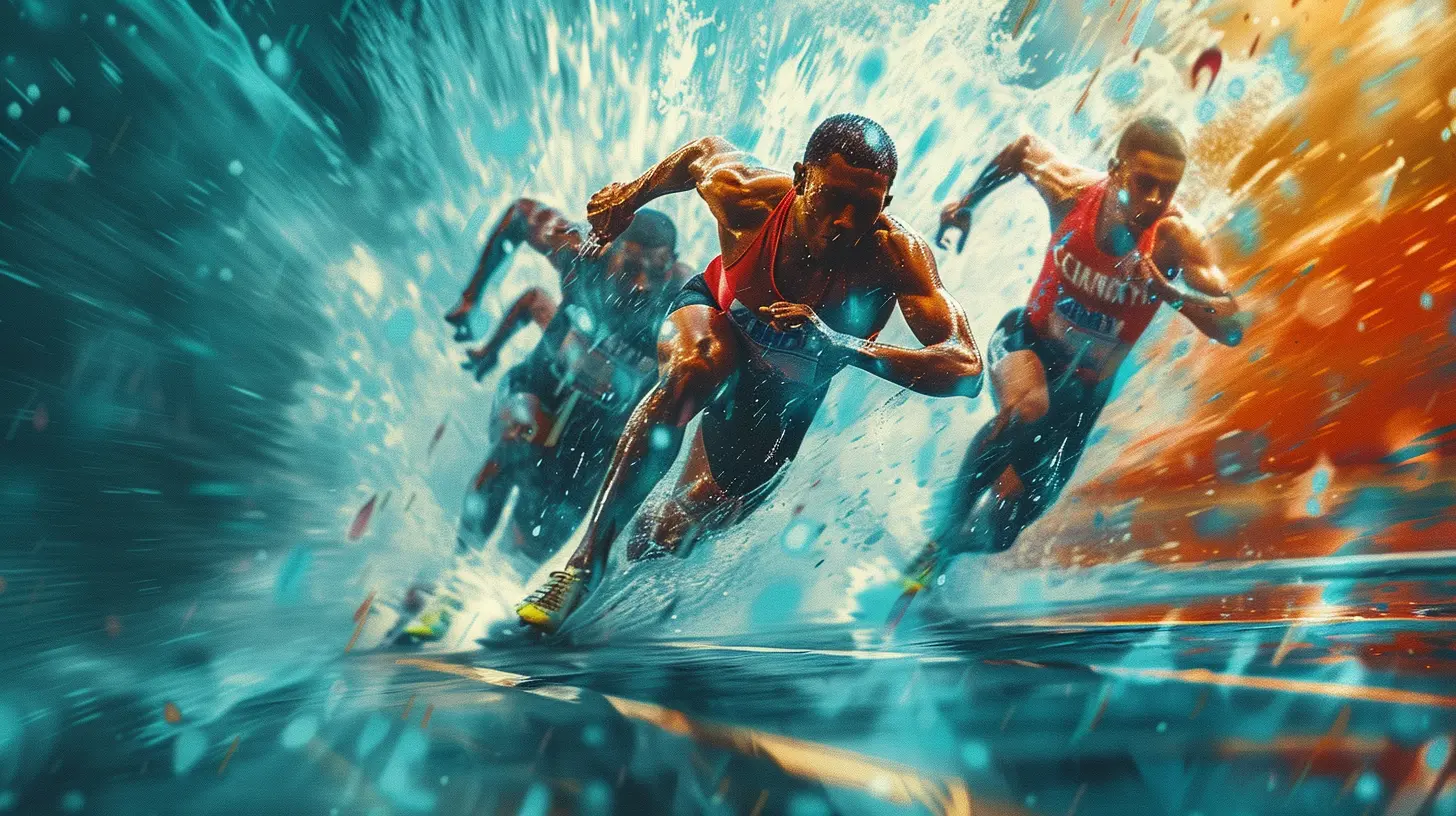The Psychological Edge in World Championship Competitions
5 August 2025
When we think about World Championship competitions, it's easy to focus on the physical prowess of athletes. We often marvel at the raw strength, agility, and endurance on display. But behind the scenes – way beyond the physicality – lies an often overlooked yet equally critical factor: the psychological edge.
In the highest-stakes competitions, where the difference between gold and silver might be a fraction of a second or a single point, the mental game becomes the secret weapon. It’s the invisible force that can turn a good athlete into a legend. So, what exactly gives competitors that psychological advantage? Let’s dive into the mental battles that occur just as fiercely as the physical ones.

The Power of Mental Toughness
To become a world champion, you can't just rely on talent alone. You need grit – that deep-down, never-give-up attitude. We’re not talking about the type of toughness that lets you endure a grueling workout. This is the mental toughness that allows athletes to keep pushing even when everything seems to be falling apart.It’s about resilience. Champions face failure, just like everyone else. They lose, they make mistakes, they experience setbacks. But what sets them apart is their ability to bounce back. They don’t dwell on defeat; they learn from it. They have short memories when it comes to losses but long memories when it comes to their goals.
Think about Michael Jordan. He was cut from his high school basketball team, but that didn’t stop him. He used that experience to fuel his drive. Or Serena Williams, who has had to overcome injuries and setbacks but always finds a way to come back stronger. These athletes didn't just rely on skill – they had the mental toughness to keep going, even when the odds were stacked against them.
The Importance of Focus
In world championships, distractions are everywhere. The noise of the crowd, the pressure of the moment, and the weight of expectations can easily pull an athlete’s attention away from the task at hand. But champions have an uncanny ability to block out the noise and zero in on their performance.Focus is like a muscle. The more you work on it, the stronger it gets. Athletes often use techniques like visualization or mindfulness to help them stay in the zone. Visualization, for instance, involves mentally rehearsing a performance. This isn’t daydreaming – it’s a deliberate practice where athletes picture themselves executing their moves perfectly.
When an athlete steps onto the field, court, or track, they’ve already played out the event a hundred times in their mind. This mental rehearsal helps them stay sharp and focused, even when the pressure is at its peak.

Handling Pressure: A Champion’s Best Friend
Pressure is a double-edged sword. For some, it can cause them to crumble. For others, it’s the fuel that propels them to greatness. The difference lies in how athletes perceive and manage pressure.World championships are the pinnacle of any athlete's career. The pressure to perform is immense. But elite competitors have learned to not only handle the pressure but thrive under it. How do they do it? It’s all about mindset.
Some athletes view pressure as a threat – something that could lead to failure. Others see it as a challenge – an opportunity to rise to the occasion. The latter is often labeled as the "growth mindset." Athletes with a growth mindset believe that challenges and setbacks are part of the journey to improvement. Instead of fearing failure, they embrace it.
Take Usain Bolt, for example. In the 2008 Beijing Olympics, the world was watching as he stepped onto the track. Did he buckle under the weight of expectations? Not even close. He shattered the 100m world record with a smile on his face. That’s the ability to perform under pressure.
Flow State: The Zone Where Champions Live
You’ve probably heard athletes talk about being "in the zone." This isn’t just some abstract concept – it’s a psychological state known as "flow." When athletes are in flow, everything seems effortless. They're fully immersed in the moment, time seems to slow down, and they perform at their absolute best.Flow is the sweet spot where challenge meets skill. It’s not too easy, but it’s not overwhelmingly difficult either. Athletes who can tap into this state during world championships are often the ones who come out on top. They’re not thinking about the crowd, the competition, or even the consequences. They’re entirely focused on the task at hand.
Achieving flow isn’t something athletes can switch on at will. It requires extensive preparation, both mentally and physically. There’s a delicate balance between challenge and ability, and when everything aligns, magic happens.

Confidence: The Belief in One's Own Ability
Confidence is the secret sauce that makes everything else work. Without it, even the most talented athletes can falter. Confidence doesn’t mean being cocky or arrogant – it’s about having a deep, unshakable belief in your abilities.In world championship competitions, confidence can be the difference between victory and defeat. When an athlete believes in themselves, they’re more likely to take risks, push boundaries, and trust their training. On the flip side, a lack of confidence can lead to hesitation, second-guessing, and ultimately, underperformance.
But here’s the thing: confidence isn’t something you can fake. It’s built through preparation and experience. Athletes who have put in the work, who have trained tirelessly, and who have overcome obstacles, naturally develop a sense of self-assurance. They know they’ve done everything they can to prepare, and that knowledge gives them confidence.
The Role of Coaches and Support Systems
Athletes don’t develop their psychological edge in isolation. Behind every champion is a team of coaches, sports psychologists, and support staff who help them build mental resilience. Coaches play a crucial role in developing an athlete’s mindset. They aren’t just there to teach technique or strategy – they’re also there to instill confidence, reinforce focus, and help athletes manage pressure.Take Phil Jackson, the legendary NBA coach. He wasn’t just known for his basketball knowledge – he was a master of the mental game. He introduced mindfulness and meditation to his teams, helping players like Michael Jordan and Kobe Bryant stay calm under pressure and maintain focus, even in the most intense moments.
Having a strong support system also provides a psychological safety net for athletes. Knowing that you have people who believe in you, who are there to pick you up after a loss, and who will push you to be your best, can be a game-changer.

The Dark Side: Mental Health Struggles in World Championships
While the mental game can give athletes a competitive edge, it's important to acknowledge the dark side of the pressure. The intense focus on performance, the high stakes, and the constant scrutiny can take a toll on an athlete's mental health.In recent years, we've seen more athletes open up about their struggles with anxiety, depression, and burnout. Naomi Osaka, for example, withdrew from the French Open in 2021 to prioritize her mental health, sparking a global conversation about the pressures athletes face. Similarly, Simone Biles stepped back during the Tokyo 2020 Olympics, citing mental health concerns as the reason.
These moments serve as a reminder that, while the psychological edge can propel athletes to greatness, it’s equally important to protect their mental well-being. The intense demands of world championship competitions can lead to mental fatigue, and athletes must be supported in managing both their physical and mental health.
Conclusion: The Mind is the Ultimate Battlefield
At the end of the day, world championship competitions are as much a mental battle as they are a physical one. The athletes who rise to the top aren’t just the fastest, the strongest, or the most skilled – they’re the ones who have mastered the mental game. They’ve learned how to focus, how to handle pressure, how to tap into flow, and how to believe in themselves, even when the odds seem insurmountable.The psychological edge is what separates the good from the great. It’s the invisible force that can turn a close competition into a decisive victory. And while we might not always see it, you can bet that every world champion has it in spades.
all images in this post were generated using AI tools
Category:
World ChampionshipsAuthor:

Nelson Bryant
Discussion
rate this article
1 comments
Velvet Montgomery
Mental strength often separates champions from the rest—key to victory.
August 22, 2025 at 12:36 PM

Nelson Bryant
Absolutely! Mental resilience is crucial; it empowers athletes to overcome obstacles and perform at their best under pressure.


